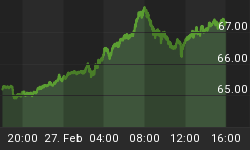The yield on the Vanguard Prime Money Market Fund is currently 4.98%. 4.98% is higher than the average yield on REITs (as of June), almost 3-times as high as the dividend yield on the Wilshire 5000, and nearly as high as the yield on the 10-year Treasury bond. With these statistics in mind, I will dare say that many aggressive investors will probably look back say a year from now and regret that they didn't stop trading and simply move into cash in mid-2006.
The danger with trying to pick which asset class will best 5% in the coming 12-months is readily apparent: like a sinner standing at the gates of heaven central banks have started to change their ways and take liquidity out of the system, which suggests that speculative forces in the marketplace will continue to be corralled going forward. And while the obvious response to a concerted attack by central banks on liquidity is to head into bonds - something Gross suggested to do last week - there is nonetheless the risk that commodity prices will not immediately follow the central bank game-plan. In other words, interest rates may stay stubbornly high, even if economic growth slows, unless commodity prices fall.
When Uncertainty Abounds...
Guided by the light of predictable and safe returns, the prudent investor can only arrive at the conclusion that there are potentially outsized risks in owning stocks, bonds, real estate, and commodities today. Moreover, these risks are unlikely to pass by anytime soon.
Incidentally, what helps keep the dangerous asset churn going even as central banks attempt to drain liquidity from the system is, ironically, that which is being heralded as marking the end of times: volatility. To be sure, volatility, at least in the near term, serves to harden the speculators belief that outsized opportunities exist. For example, a crash in precious metals represents an opportunity in bonds, falling emerging market stocks means there is money to be made in US dollars, falling real estate represents an opportunity in art, etc...
But while a pickup in volatility may attract the thrill seekers, it is not a reason for the average investor to get excited. Rather, volatility in today's environment suggests that bubbly asset classes are fighting for dollars, that investor risk tolerances have peaked, and that the 'reflation' dynamic in the marketplace since 2003 is about to evolve into another animal. This action spells only one thing: uncertainty.
Yes, there are isolated opportunities to be found in the equity markets and along the curve. Perhaps also the astute real estate investor can find bargains as the pool of foreclosures increases. But no, now is not the time to deploy shrewd macro intelligence to try and pinpoint the undervalued asset class. As the story goes, cash is king - and it shall remain king until either commodity prices, stock prices, or both, severely buckle.















